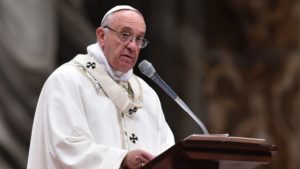 Recently, our spontaneously-tongued pontiff, Pope Francis, made comments to journalists regarding his impression of the current state of marriage in the Church (readers of Italian can find his comments here, under Terza Domanda).
Recently, our spontaneously-tongued pontiff, Pope Francis, made comments to journalists regarding his impression of the current state of marriage in the Church (readers of Italian can find his comments here, under Terza Domanda).
“It’s [i.e., marriage is] provisional, and because of this the great majority of our sacramental marriages are null. Because they [the hypothetical couple] say, ‘Yes, for the rest of my life!’ but they don’t know what they are saying. Because they have a different culture. They say it, they have good will, but they don’t know.”
Many individuals have rightly taken issue with the Holy Father’s words here. Responses have come from canon lawyers, clerics, and lay scholars alike. I shall not wade through all of these critiques, nor attempt to clarify what the Pope “might have been trying to say” about the current state of marriage in the Church. Rather, Francis’ comments reminded me of a conversation I had with my wife regarding this same subject. At the time, she was actively involved in parish ministry and witnessed first-hand the poor catechesis and cultural deformity from which many couples seeking sacramental marriage suffered. On one occasion she voiced her concern to me in words very similar to those of Pope Francis; essentially stating that these couples had no idea what marriage means.
We ought to be very careful, however, when we play the cultural “blame game” for all of society’s ills. As a professor – and perhaps firstly as a human being – what concerns me most is the abrogating of moral responsibility. Moral responsibility comes from freedom, and freedom comes from our ability know and will. Pleading ignorance is a way of saying that I was not free to make a choice because my ability to know was substantially compromised. In many situations, of course, this happens when the truth is actively withheld from a particular party making a decision. But the culture in which we live cannot change what our bodies are, or what they do, or the nature of a promise. While Christ’s teaching on the indissolubility of marriage is a part of divine revelation, the fact that marriage establishes a binding relationship – a relationship signified and consummated by a marital act – is not. To claim that “the great majority of our sacramental marriages are null” due to ignorance, therefore, undermines the human capacity to apprehend any natural moral truth or reality. Our culture, I would argue, does not prohibit us from understanding the concepts of marriage or permanence or indissolubility but, rather, facilitates in an ever more increasing fashion our desire not to live in accordance with these realities. As with original sin, it weakens our wills more than our intellects.
As a married man, I understand the temptation to say that knowledge about marriage must be gained first-hand. There is wisdom in that belief, but one cannot push that sentiment too far. Saying “I do” at the altar cannot be considered “free from ignorance” only if accompanied by the depth and breadth of knowledge about marriage that one would only possess after 10 or 20 or 30 years of married living. That is a reductio ad absurdam. So yes, Holy Father, the husband and father in me – with a half-smile – agrees: they don’t know what they’re saying. But as a freely thinking and willing human being I must disagree: they know what they’re saying, but only their cooperation with God’s grace will enable them to live what they have promised.
Anthony Coleman teaches theology for Saint Joseph’s College Online.
